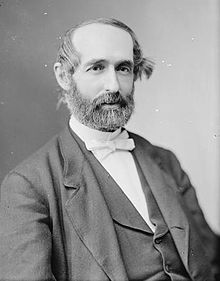Frederick W. Seward
| Frederick William Seward | |
|---|---|
 |
|
| 6th & 11th United States Assistant Secretary of State | |
|
In office March 6, 1861 – March 4, 1869 |
|
| President |
Abraham Lincoln (1861-1865) Andrew Johnson (1865-1869) |
| Preceded by | William H. Trescot |
| Succeeded by | J.C. Bancroft Davis |
|
In office March 16, 1877 – October 31, 1879 |
|
| President | Rutherford B. Hayes |
| Preceded by | John Cadwalader |
| Succeeded by | John Hay |
| Personal details | |
| Born |
July 8, 1830 Auburn, New York, U.S. |
| Died | April 25, 1915 (aged 84) New York, U.S. |
| Political party | Republican |
| Spouse(s) | Anna Wharton Seward |
| Profession | Lawyer, Writer, Editor, Politician |
Frederick William Seward (July 8, 1830 – April 25, 1915) was an American politician and member of the Republican Party who twice served as the Assistant Secretary of State. The son of United States Secretary of State William H. Seward, he served as Assistant Secretary from 1861 to 1869 under both Abraham Lincoln and Andrew Johnson and then from 1877 to 1879 in the administration of Rutherford B. Hayes.
Seward was born in Auburn, New York, the son of United States Secretary of State William H. Seward and Frances Adeline Seward and elder brother of General William Henry Seward, Jr..
Frederick attended the Pearl Street Academy from 1839-1940, which is located in Albany, NY; while his father was Governor of New York State. He attended Union College and graduated in 1849 and was admitted to the bar in Rochester, New York in 1851.
After graduating from law school, Seward served as a secretary to his father from 1849 to 1857 along with working as the associate editor of the Albany Evening Journal from 1851 to 1861.
On February 21, 1861, Seward arrived at the Continental Hotel in Philadelphia carrying valuable information in the form of a letter from his father William Seward for President-elect Abraham Lincoln. The letter contained information gathered by Colonel Charles P. Stone and General Winfield Scott.
...
Wikipedia
